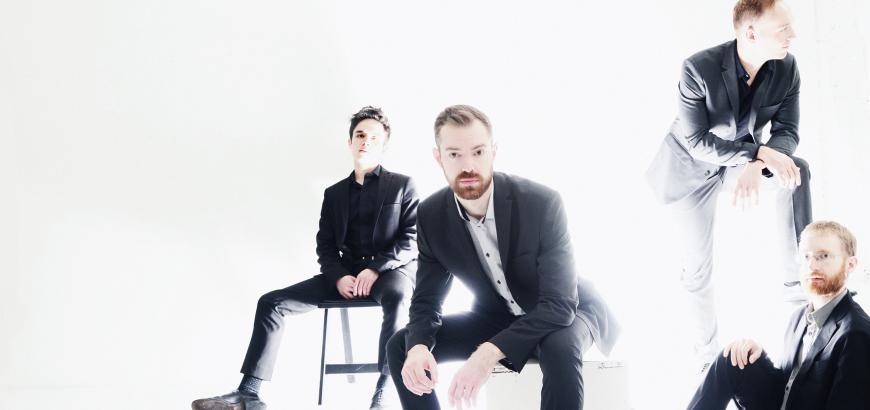The members of the JACK Quartet don portable EEG and wearable muscle neuron sensors in "Human Subjects," the culminating performance of the group’s extended residency at the University of Washington, during which the musicians collaborated with UW faculty in DXARTS and Music Composition to explore complex integrations of brain and body signals into the domains of artistic performance. During the residency, the JACK (Austin Wulliman, Chris Otto, John Richards, Jay Campbell) worked with composers Juan Pampin and Richard Karpen as well as neuroscientists and a team of research staff from DXARTS and Music to explore brain and nervous system sensing methodologies as extensions to master musicians' traditional performance practice. This collaboration was made possible through the UW Creative Fellowships Initiative with funding from the Andrew W. Mellon Foundation.
Please join us for a post-show conversation with the artists following the performance.
Program Notes
Human Subjects is the culmination of a collaboration between the JACK Quartet and composers Juan Pampin and Richard Karpen. The piece was composed through a three-year generative process involving a series of experiments in which the members of the JACK donned EEG headsets and EMG armbands to explore new extended performance techniques based on brain and nervous system sensing. Human Subjects gradually emerged from those experiments; for instance, the first section of the piece is the result of an experiment in which the rhythm of the brain waves of each player was sonified and sent back to the player via earpiece headphones. The JACK were asked to imitate the rhythms of their brain waves, playing clicks on their instruments, trying to match the sonified data as closely as possible. In order to achieve this task, performers required extreme concentration. The closer they come to matching the data, the larger the amplitude of their brain waves and the louder the sound coming out of the speakers. This section deploys different EEG bands (theta, alpha, beta, etc.) to create a complex poly-rhythmic structure. In other sections of the piece, real-time EMG data coming from both arms of each player controls the sound processing of their instruments. This data was used to train neural networks allowing detection of multiple gestures ranging from individual notes played at different rates to trills and tremolos and the creation of a continuum between them. This continuous data space gave the players control of processing algorithms’ reactions to the rate of firing of neurons governing their left and right hands. This strategy is used in a section close to the end of the piece to create a dense harmonic texture, which the players can sculpt by playing different gestures on their instruments, controlling the multiple parameters of a feedback delay network. Many other combinations and mappings of those sensing technologies were used to compose other sections of the piece.
While the title Human Subjects refers to the experimental methodologies that led to the composition, it also puts emphasis on the central role of the human body in the creation and realization of the piece. From that point of view, one can understand not only a mind/body connection or continuum, but one in which the mind is body, in which there is only body. Rather than diminishing the sense of the mystery of how we think and of what we might call spirituality, this point of view—that there is only body, and that the mind is a part of it—makes the entire idea of who, where, why, how, what we are even more deeply astounding and unexplainable. And that is exactly the role of Art and our approach to integrating science and technology into it—to create experiences that put the audience into this “zone.”
–– JP & RK
Credits
JACK Quartet
Austin Wulliman, Chris Otto, violins
John Richards, viola
Jay Campbell, cello
Composers & Project Directors: Juan Pampin and Richard Karpen
Technical Director: Marcin Pączkowski
Technical Assistant: Haein Kang
Sound Crew: Doug Niemela and Mike McCrea
Scientific Advisors: Thomas Deuel and Eberhard Fetz (DXARTS Brain + Art Lab)
Artist Bios
JACK Quartet
Deemed "superheroes of the new music world" (Boston Globe), the JACK Quartet is "the go-to quartet for contemporary music, tying impeccable musicianship to intellectual ferocity and a take-no-prisoners sense of commitment." (Washington Post) "They are a musical vehicle of choice to the next great composers who walk among us." (Toronto Star)
The recipient of Lincoln Center's Martin E. Segal Award, New Music USA's Trailblazer Award, and the CMA/ASCAP Award for Adventurous Programming, JACK has performed to critical acclaim at Carnegie Hall (USA), Lincoln Center (USA), Miller Theatre (USA), Wigmore Hall (United Kingdom), Muziekgebouw aan 't IJ (Netherlands), IRCAM (France), Kölner Philharmonie (Germany), the Lucerne Festival (Switzerland), La Biennale di Venezia (Italy), Suntory Hall (Japan), Bali Arts Festival (Indonesia), Festival Internacional Cervatino (Mexico), and Teatro Colón (Argentina).
Comprising violinists Christopher Otto and Austin Wulliman, violist John Pickford Richards, and cellist Jay Campbell, JACK is focused on new work, leading them to collaborate with composers John Luther Adams, Chaya Czernowin, Simon Steen-Andersen, Caroline Shaw, Helmut Lachenmann, Steve Reich, Matthias Pintscher, and John Zorn. Upcoming and recent premieres include works by Derek Bermel, Cenk Ergün, Roger Reynolds, Toby Twining, and Georg Friedrich Haas.
JACK operates as a nonprofit organization dedicated to the performance, commissioning, and spread of new string quartet music. Dedicated to education, the quartet spends two weeks each summer teaching at New Music on the Point, a contemporary chamber music festival in Vermont for young performers and composers. JACK has long-standing relationships with the University of Iowa String Quartet Residency Program, where they teach and collaborate with students each fall, and the Boston University Center for New Music, where they visit each semester. Additionally, the quartet makes regular visits to schools including Columbia University, Harvard University, New York University, Princeton University, Stanford University, and the University of Washington.

Richard Karpen (b. New York, 1957) is a composer and researcher in multiple areas of music and the arts. His compositions for both electronic media and live performance are widely known, recorded, and performed internationally. Since the early 1980s he has also been in the forefront of the development of computer applications for music composition, interactive performance, and the sonic arts. He is also active as pianist.
Karpen is a Professor of Digital Arts and Experimental Media (DXARTS) and Music Composition at the University of Washington in Seattle. Also at the UW he was founding Director of DXARTS in 2001 and Director of the School of Music from 2009-2020. He has been the recipient of many awards, grants, and prizes, including those from the National Endowment for the Arts, the Bourges Contest in France, and the Luigi Russolo Foundation in Italy. Karpen has composed works for many leading international soloists, such as soprano Judith Bettina, violists Garth Knox and Melia Watras, trombonist Stuart Dempster, flutists Laura Chislett and Jos Zwaanenberg, guitarist Stefan Östersjö, and ensembles such as The Six Tones, JACK Quartet, The Seattle Symphony, and the Harry Partch Ensemble. Karpen is a founding member, with Cuong Vu, of the experimental improvisation ensemble Indigo Mist. As a pianist, Karpen has performed and recorded with Cuong Vu, Bill Frisell, Ted Poor, Steve Rodby, and others. Karpen's compositions and performances have been recorded on a variety of labels including Wergo, Centaur, Neuma, Le Chant du Monde, DIFFUSION i MeDIA, Fleur du Son, Capstone, and RareNoise.

Juan Pampin (b. Buenos Aires, 1967) is Professor of composition at University of Washington and founding faculty member of the Center for Digital Arts and Experimental Media (DXARTS) for which he currently serves as Director.
Pampin received an MA in Composition from Conservatoire National Supérieur de Musique de Lyon, France and a DMA in Composition from Stanford University, where he studied with composer Jonathan Harvey. Juan Pampin's works explore the territory articulated by the concepts of space, memory, and material, using algorithmic composition and signal processing tools of his own development.
Juan Pampin's music compositions, including works for instrumental, digital, and mixed media, have been performed around the world by world-class soloists and ensembles. His work "On Space" –for percussion sextet and 3D electronic sounds– has been recently released on CD as part of Les Percussions de Strasbourg 50th anniversary historical edition box published by Universal France.
